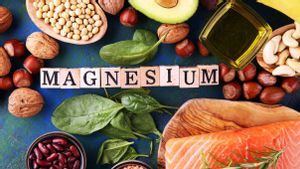YOGYAKARTA Through busy days and realities that don't match expectations, it can trigger bad mood. To overcome this, the minerals contained in food can help improve mood, namely magnesium.
Magnesium has the potential to increase enthusiasm, sleep quality, gut regularity, and brain health. According to neuropathy doctor and medical director at MegaFood, Erin Stokes, MD., magnesium is a cofactor for more than 300 enzymes in the human body. The body will not get the enzymes adequately because it does not have body minerals. For magnesium that has the potential to regulate mood, research is shown to be published in the National Library of Medicine.
The study noted that low magnesium levels are associated with fatigue, headaches, and physical stress. In addition, based on 2020 reviews published in the journal Nutrients, insufficient magnesium levels in the body have been associated with anxiety, depression, and other mood disorders. On the other hand, Stokes said a magnesium that is enough to increase a sense of calm and relaxation. This is partly due to sufficient amounts of minerals that allow the central nervous system to function properly.
"Magnesium plays an important role in regulating neurotransmitters that send messages throughout the brain and body, helping to improve brain function that manages stress and anxiety," explains Amy Shapiro, MS, RD. reported by Well+Good, Sunday, January 21.
Shapiro added, magnesium works on hypotalamus, the part of the brain that controls the pleitary and adrenal glands. Both are the glands in charge of responding to stress. In short, when you have enough magnesium, you are in a better position to enable healthy transmission between the brain and your body. The results may be greater resistance to stress, a better mood, and fewer symptoms of mental health imbalance.
SEE ALSO:
So what foods contain magnesium to get some of the benefits mentioned above? According to the National Institutes of Health (NIH), adult women need about 310-360 milligrams of magnesium every day, varying by factors such as age and gestation/featuration status. While adult men require 400 to 420 milligrams. To achieve this amount through whole food, labuli will help you achieve significant progress. According to the FDA, one ounce (28 grams) of labus seeds contain 156 milligrams of minerals. Other sources of food containing magnesium include nuts, beans, beans, and green vegetables.
Stokes explained that almonds may be the best consumed for optimal benefits, including improving mood. Another addition, by consuming only 2 ounces, it can get as much as 180 milligrams magnesium. You can also eat mete beans and peanuts. In addition, Shapiro adds to the list of magnesium high foods, including spinach, eggs, yogurt, milk, and bananas.
The English, Chinese, Japanese, Arabic, and French versions are automatically generated by the AI. So there may still be inaccuracies in translating, please always see Indonesian as our main language. (system supported by DigitalSiber.id)


















